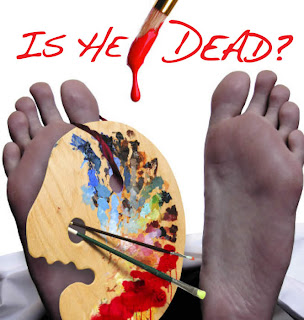
Olney Theatre's Saturday matinee production of Mark Twain's Is He Dead? (through March 8th) was a delight. Mark Twain's view of the European art world, written when he lived in Vienna! What could be better than that? Not cornpone, but cosmopolitan, Mark Twain...in a production of a charming, laugh-out-loud farce. And one of the the first jokes was about a bank collapse.
A brief internet search revealed the show played on Broadway in 2008, directed by Michael Blakemore. The manuscript, discovered by Shelly Fisher Fishkin, has been published as by the University of California Press. And a review by Mark Dawidziak, on Twainweb.net, explains why it is so worthwhile:
First and foremost, Is He Dead? must be considered an important contribution to literary scholarship in general and Twain studies in particular. This is decidedly third-rate Twain, but what of it? No work by Mark Twain is uninteresting or unimportant, after all, so anything he wrote should prove fascinating reading from a purely literary standpoint.
If we recovered a largely unknown and inferior play by Tennessee Williams, would it be of interest? Would its publication be almost a sacred duty? You bet your jumping frog it would. Even the failures of a genius command our attention.
Working with a text established by the incomparable Mark Twain Project team in Berkeley, Fishkin has gone beyond the previous researchers who gave slight notice to the play and has endeavored to bring it to public attention. And as the line goes from Arthur Miller's Death of a Salesman, "attention must be paid." So the student of literature, as well as theater, has much to mull over here. For better or worse, this is a complete work by Mark Twain, folks, and those don't pull into town on the noon stage every day.
From the purely Twainian standpoint, Is He Dead? is still more fascinating. The Twain buff can and should have a jolly time reading the play, noticing along the way how many distinct echoes there are of previous works. Liberally "borrowing" from himself, Twain pulls out the humorous description of the "long, low dog" (the dachshund) from Following the Equator. He appropriates the pungent idea of limburger cheese being mistaken for a rotting corpse from "The Invalid's Story." He repeats the routine of vague and perplexing answers from "An Encounter with an Interviewer." He resurrects jokes from "His Grandfather's Old Ram" in Roughing It. He lifts the device of the story's hero watching his own funeral from Tom Sawyer. And on and on goes the game of "spot the influences." In fact, the entire play is based on his 1893 short story, "Is He Living or Is He Dead?" In this tale, we are told how French artist Jean-Francois Millet faked his own death, knowing that unknown painters often become hot items after they are dead. Sure enough, the lionized Millet becomes "posthumously" rich and famous.
All of these associations are wonderfully detailed in Fishkin's insightful foreword and afterword material, which provide splendid background on "Mark Twain and the Theatre," "Mark Twain and Art," the real Millet's life and career, the play's many associations to other Twain works, the theater of Twain's day, and Twain's attempts to get Is He Dead? produced.
The Twainiac will find Fishkin's illuminating essays as valuable as the play itself. They provide all the necessary context for approaching and appreciating the comedy about Millet and his artist friends. You may not agree with Fishkin on the quality of the play, but you can't help being impressed by the thoroughness of her research and the vitality of her writing. As elegant as Fishkin's prose are the original illustrations by woodcut engraver Barry Moser, the Pennyroyal Press proprietor whose work graced the 100th anniversary edition of Huckleberry Finn published by the University of California Press in 1985.
Twain said he wrote the play for fun, and that's precisely how a Twain aficionado should read it. Some of the lines are vintage Twain. There are several nifty phrasings ("O, shucks! you don't know as much as an art-critic," one of the starving artists says to another). And the writer manages to sneak in a few withering satirical blasts at the art world, society and, of course, the French. In many ways, Is He Dead? is a better play than, say, Twain's miserable attempt to adapt Tom Sawyer. There's no whitewashing the ineptitude of that terribly off-key effort, which, despite being based on a book the author called "simply a hymn," also demonstrates Twain's tin ear as a playwright.